Are you breastfeeding and looking for a healthy meal plan for you and baby?
Then look no further.
After reading this post, you will learn:
- The healthiest foods you should eat when breastfeeding,
- The key nutrients that will keep you and your baby healthy,
- Tips for creating your own personalized breastfeeding meal plan, and
- Answers to the most common breastfeeding questions.
Are you ready? Let’s get started.
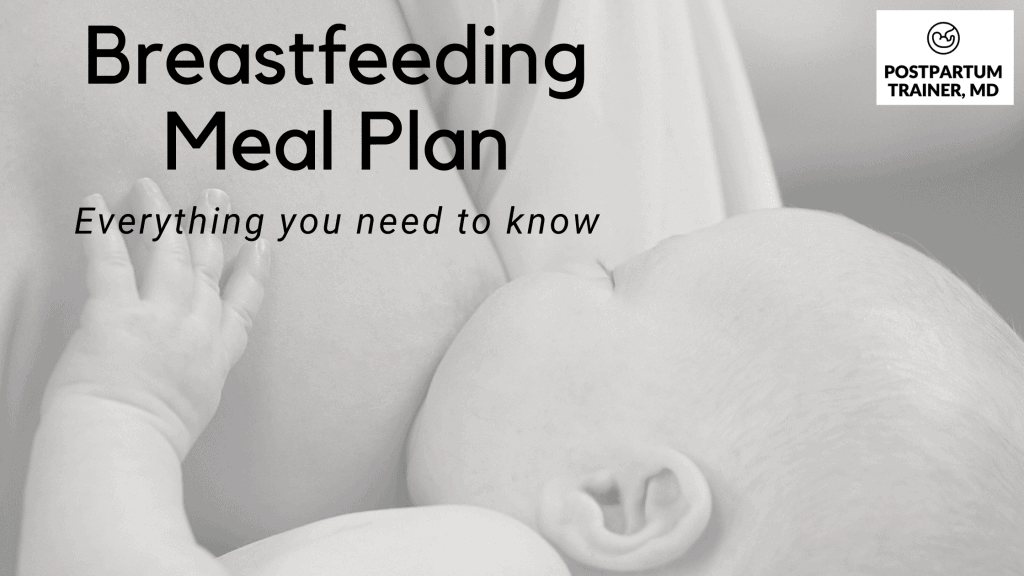
What Should You eat when you’re breastfeeding
So let’s start by asking what is a healthy breastfeeding diet? What foods should you include in your meal plan?
I have broken down the key foods you need to consume into three broad categories. They just so happen to be the three major macronutrients.
- Lean Protein
- Healthy Fats
- Nutrient-Rich Carbohydrates
Let’s go over each category, one-by-one.
Lean Proteins
Of the three macronutrients, protein is the easiest to understand.
Protein is the nutrient responsible for the structure of every cell in your body – especially the ones found in your bones, muscles, hair, skin, and nails.
But what you might not know is that protein is used to produce several hormones and other chemicals.
In fact, the hormone responsible for lactation, Prolactin, is a protein based hormone.
How Much Protein Should You Eat While Lactating?
Now, you don’t have to eat large amounts of protein to get all of the benefits of this macronutrient. Studies show that consuming 15-20 additional grams of protein per day is sufficient for breastfeeding women.
This is in addition to the recommended 0.5 grams of protein per pound of bodyweight you should already be consuming, on a daily basis.
- So if you weight 140 lbs, that means you should be consuming ~70 grams of protein per day. If you are breastfeeding, bump it up to about 85-90 grams.
The Best Protein Sources For Breastfeeding Moms
So which foods contain the best quality protein? They are:
- Chicken Breast
- Turkey
- Salmon*
- Greek Yogurt
- Tofu
- Edamame
- Beans/Legumes
- Quinoa
- Nuts and Nut Butters
*You don’t want to overdo it with fish. I’ll explain why later.
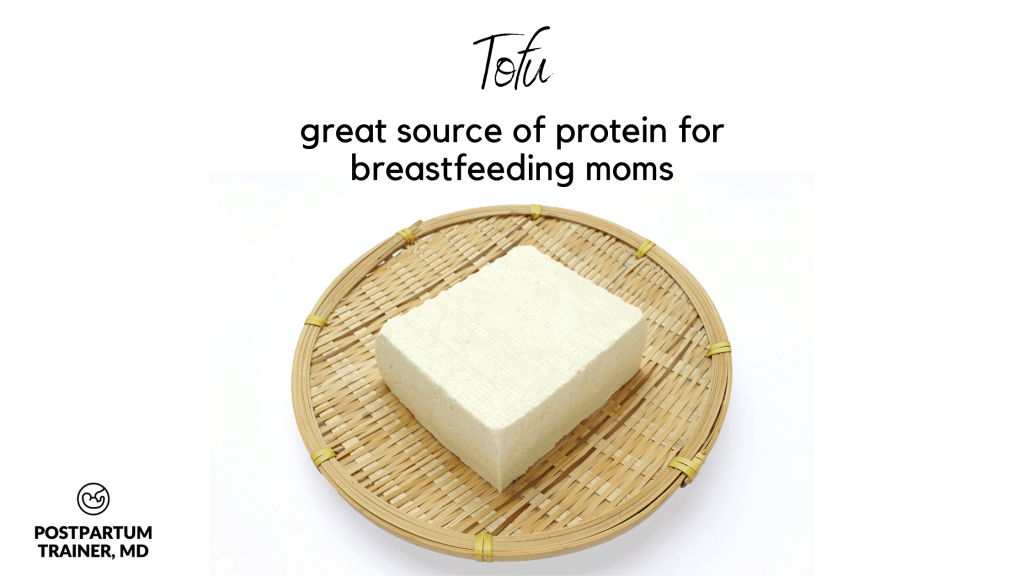
Okay, let’s move on to the fat.
Healthy Fats
The next macronutrient you must include in your diet are healthy fats.
So which fats are the healthiest?
Unsaturated fats, specifically, the Omega-3 variety. Studies are finding that omega-3 fats are important for brain development and function, immune system health, and metabolism regulation.
As your baby’s brain is developing, it is critical to provide this nutrient into their diet via breast milk.
However, not every fat you consume needs to be of the omega-3 variety.
That’s because fat is necessary for the absorption of key vitamins such as A, D, E, and K, for hormone development, as well as providing insulation to your body.
It is also the nutrient responsible for the growth and weight gain of your baby as it makes up about 40% of the energy in your breastmilk.
Below, I will give you several examples of the types of fats you can eat while breastfeeding.
How Much Fat Should You Eat While Lactating?
There aren’t clear cut guidelines or recommendations on how much fat you should consume while lactating.
With that said, it is a good idea to not overdo it with fat intake. It is the nutrient with the highest caloric density, meaning that 1 gram of fat has 9 calories, compared to 4 calories in 1 gram of protein.
- My recommendation is to consume ~3 servings of healthy fats per day.
The Best Fat Sources For Breastfeeding Moms
So which foods contain the best sources of fat? They are:
- Nuts and nut butter (especially walnuts)
- Seeds and seed butter (especially chia seeds)
- Avocado
- Fatty Fish*
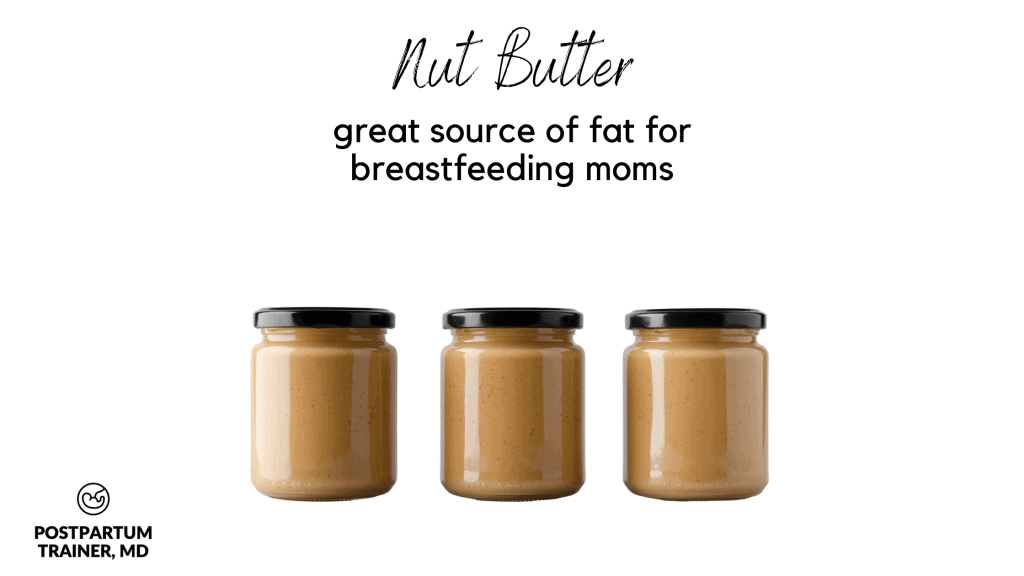
A Quick Word On An Omega-3 Supplement
*As I said before, it is a good idea to keep fish intake to a minimum while breastfeeding.
That’s because a lot of fish in our markets have high levels of mercury contamination – a substance that you do not want to pass onto your baby.
Unfortunately, fatty fish are the best sources of key Omega -3 fatty acids, namely, DHA and EPA.
To get past this, I recommend you take an algae based omega-3 supplement.
The one I am currently taking can be found here on Amazon.
Okay.
Last but not least are the nutrient-rich carbohydrates.
Nutrient-Rich Carbohydrates
The last macronutrient is the carbohydrate. So many different foods fall into this category.
Some good, others not so good.
While you can certainly enjoy some cookies, ice cream, and pizza from time to time (I know I do 🙂 ), it is important that you include other carbs in your diet as well.
Which carbs?
The ones that contain the highest sources of vitamins and minerals which I will go over below. (Source: Nutrition during lactation.)
Calcium
Calcium is probably the most important micronutrient for breastfeeding for two primary reasons
- Calcium is necessary for maintaining your bone mineral density. There is a theoretical risk that calcium deficiency and breastfeeding could lead to osteoporosis, although no studies have confirmed this.
- Your baby needs it for the development of strong bones!
What foods are high in calcium?
- Dairy products (milk, cheese, greek yogurt)
- Dark leafy greens
- Tofu
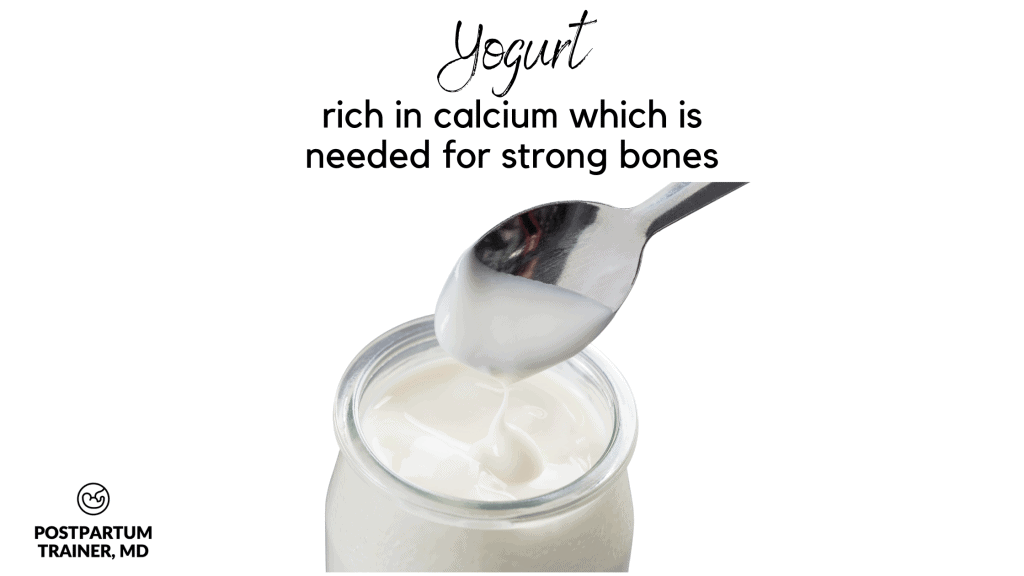
The following nutrients don’t have a lot of data supporting them, but nutrient deficiencies have been reported in studies of lactating women.
Either way, you cant go wrong by including them in your meal plan.
Magnesium
Magnesium is a nutrient that regulates several bodily functions such as: metabolism, nerve function, muscle health, and blood pressure regulation, just to name a few.
Some reports indicate that many people are deficient in Magnesium. Either way, its good to ensure that you get enough of this nutrient while lactating.
What foods are high in Magnesium?
- Legumes
- Nuts
- Seeds
- Oysters
Folate
Folate is one of the most important nutrients during early pregnancy as it is responsible for helping form the baby’s neural tube. Aside from that, folate is also important for DNA synthesis and cellular repair.
In other words, both you and your baby need this nutrient.
What foods are high in Folate?
- Leafy green vegetables
- Fruits
- Legumes
Vitamin B6
Vitamin B6 aka Pyridoxine is a nutrient responsible for maintaining the function of the nervous system among other things.
There have been cases of Vitamin B6 defificient moms having babies with central nervous system disorders.
Thankfully, deficiencies in B6 is rare, as you can get this nutrient from several food groups.
What foods are high in Vit B6?
- Bananas
- Sweet potatoes
- Spinach
- Nuts
- Meat
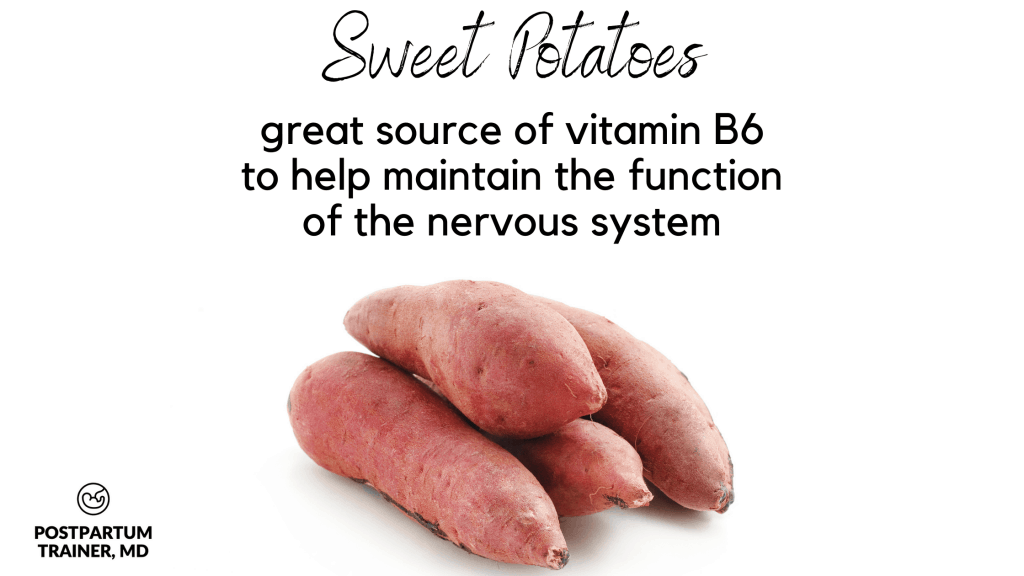
Zinc
Zinc is a nutrient necessary for immune system function, as well as wound healing.
Similar to B6, getting this nutrient shouldn’t be an issue as long as you eat a varied diet.
What foods are high in Zinc?
- Meat
- Seafood
- Legumes
- Whole grains
Those are the major nutrients that experts recommend you pay close attention to. With that said, you certainly want to ensure you are getting adequate levels of all the other major nutrients as well.
This includes:
- Thiamine (found in salmon, legumes, nuts, seeds, tofu, whole grains)
- Vitamin A (found in carrots, sweet potatoes, leafy greens, salmon)
- Vitamin D (best taken in supplement form – this is the one I use from Amazon)
- Vitamin B12 (best taken in supplement form – this is the one I use from Amazon)
- Vitamin E (found in leafy greens, nuts, seeds)
- Iodine (found in iodized salt, cranberries, fish, potatoes)
**So as you can see, the same carbohydrates appear multiple times for different nutrients. This is especially true for foods like whole grains, legumes, dark leafy greens, and fruits. **
These are the carbohydrates you should focus on!
Tips To Create A Healthy Breastfeeding Meal Plan
So now that you know what foods you should include in your meal plan, let’s go over some tips on how to create your own meal plan.
I think this is more important than giving you a blanket meal plan.
It’s better to learn how to find a plan that works for you and your situation.
Here’s how:
- Try to create 3-5 staple meals (containing the above foods) that you always rotate into your daily diet.
- Make sure to include lean protein as often as you can – always ask yourself, how can I increase the protein content of my meal?
- Batch cook as much as possible – many of the foods above lend themselves to meal prep. For example, you can cook large servings of whole grains, legumes, lean meats, and leafy greens to last 3-4 days. (I love the Instant Pot for this)
- Drink a tall glass of water with every single meal – it is very easy to get dehydrated while breastfeeding.
- Listen to hunger cues – it is your body telling you that it needs more energy. Don’t be afraid to eat more calories (more on that later).
For more information on healthy eating while breastfeeding, check out The Postpartum Trainer’s Nutrition Guide.
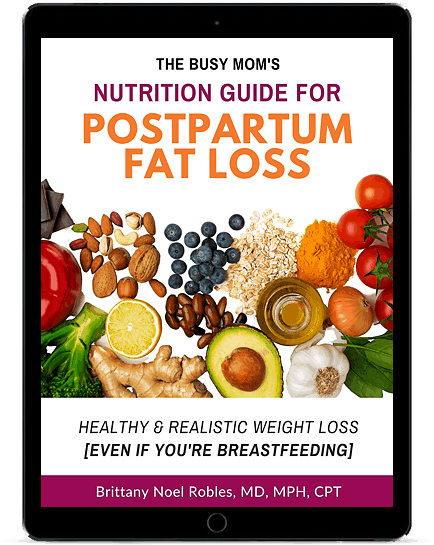
What are good meals to eat while breastfeeding?
Using the above recommendations, you can mix and match so many different meals.
My best tip is to double dip on foods that contain multiple nutrients listed above.
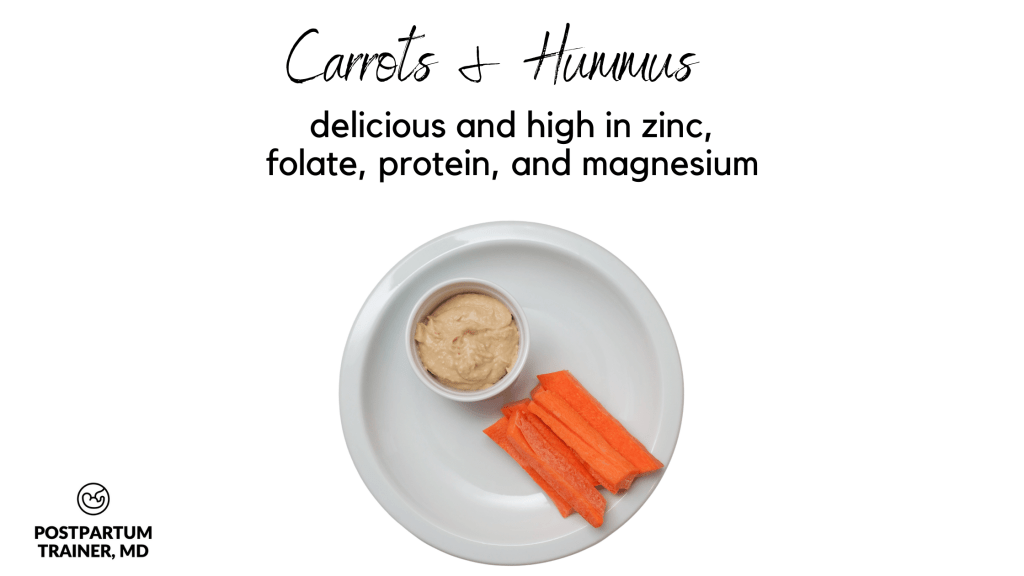
For example:
- Breakfast: Oatmeal with berries and nut butter
- Lunch: Quinoa with lean chicken breast and mixed vegetables
- Snack: Carrots with hummus (which is technically a legume 🙂 )
- Dinner: Mixed greens salad with walnuts and tofu
Are There Any Foods That help produce breast milk?
There isnt a lot of data on specific foods or diets to help increase milk supply.
With that said, the most important thing you need to do for adequate milk supply is to HYDRATE.
If you didn’t already know, breast milk is mostly composed of water. That’s why it is important for you to drink enough water to make breast milk, and to hydrate your own body!
So, how much water should you drink?
Enough so that your urine is pale yellow.
Or you can just drink 0.5 oz of water per pound of your own body weight per day. For example if you weigh 140 lbs, drink approximately 70 oz of water per day.
A Quick Word On Herbal and Pharmaceutical Galactogogues
There are a few studies looking at different types of herbal supplements and pharmaceutical medications to increase milk supply.
They call these substances galactogogues: which is a fancy way of saying “milk producing.”
The most common herbal supplements studies include fenugreek, garlic, and milk thistle. Medications include dromperidone and metoclopramide.
Unfortunately, results are mixed.
Some studies show benefits, others don’t.
In addition, the safety / side effect profile for the herbal supplements are unknown.
If you are considering using one of these medications, be sure to speak with your provider and do your own research!
What Foods Should You Avoid When You’re Breastfeeding?
So, what foods should not be eaten when breastfeeding? There are three main things you should keep to a minimum while lactating.
They are:
- Caffeine (as too much can pass into your breast milk)
- Alcohol (for obvious reasons)
- Fish (due to high mercury exposure)
In general, it is a good idea to keep your caffeine intake to 200 milligrams per day (which is about one cup of coffee).
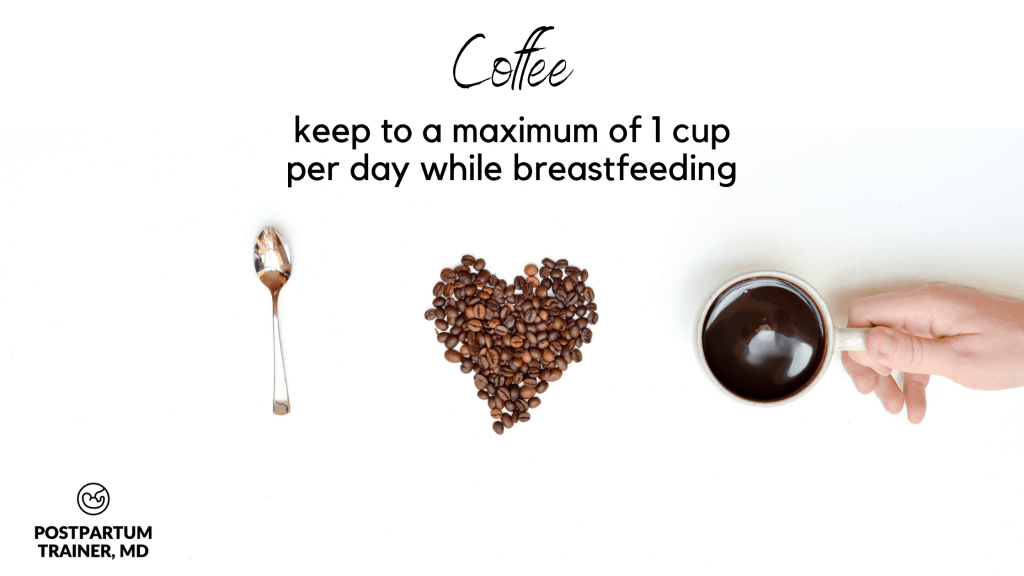
An occasional glass of wine with dinner is fine as well, but do not breast feed or pump shortly after consuming it. Give it a few hours to clear from your system as per the CDC.
Lastly, keep your fish consumption to 1-2 times per week. Do your best to avoid the highest mercury fish which include:
- shark
- tilefish
- swordfish
- tuna
Why does breastfeeding make me so hungry?
It is perfectly natural to get hungry when you breastfeed. Producing breast milk is very energy intensive.
This means that your body has to use a lot of resources to make milk that is meant to help another human being grow and develop!
That is why you need to consume additional calories while you are breastfeeding.
How Many Calories Do You Need When You’re Breastfeeding?
So how much should a breastfeeding mom eat? In general, you will need to consume at least 400 additional calories per day while breastfeeding.
A simple calculation that approximates the number of calories you need per day is to take your bodyweight and multiply it by 12-14.
So if you weigh 140 lbs, that means you need anywhere from 1680-1960 calories per day. When breastfeeding, add an additional 400 calories on top of this.
What If I Don’t Count Calories?
That is okay. Just make sure that you eat 3 well balanced meals per day, with 1-2 snacks in between.
Even if your goal is to lose weight, you can and should still consume at least 400 extra calories daily. Weight loss does not appear to have a negative impact on your milk supply.
Other Related Questions
Which foods can I eat again while breastfeeding that I had to avoid during pregnancy?
Most of the foods that were off limits during pregnancy can now be eaten again postpartum.
So yes, you can eat soft cheeses, deli meats, and fish.
However, you do want to keep fish to a minimum due to the higher risk of mercury contamination. The problem is, fish contain heart and brain-healthy Omega 3 fatty acids – specifically EPA and DHA.
The good news is, you can get these from a supplement. I prefer the vegan sources made from algae.
Why is it important to eat healthy when you’re breastfeeding?
It is important to eat healthy when you are breastfeeding because your body creates milk from the nutrients present in your body. If you lack certain nutrients in your diet, your breast milk will also show decreased amounts of those nutrients.
That is why you want to have a diversified, nutrient-rich diet, containing all the things your baby needs to thrive.
Also, good nutrition is important because the taste and composition of your breastmilk can change depending on what you eat on a daily basis.
By following a healthy breastfeeding meal plan, you will give you and your baby the nutrition you both need to thrive!
Does drinking milk increase breast milk supply?
There is no evidence that drinking cows milk will help increase your breast milk supply. Rather, excessive milk consumption can cause problems in your baby such as gas, diarrhea, rash, or colic.
What foods can make a breastfed baby gassy?
The same foods that make adults gassy. These include:
- Leafy greens such as kale, spinach, and lettuce
- Other high fiber foods such as beans, broccoli, and brussels sprout.
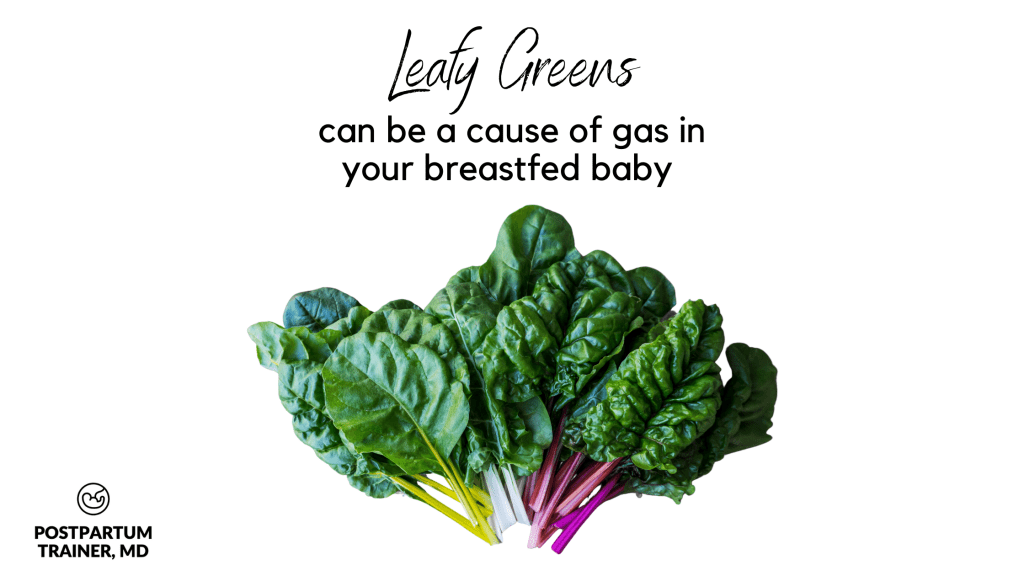
With that said, some of these foods are important to include in your diet – just experiment and see what works for you and your baby.
Final Words On Healthy Nutrition While Breastfeeding
Breastfeeding is an important time to ensure that you are providing your body with the necessary nutrients it needs to support you and your baby.
When in doubt, try to consume more:
- lean proteins,
- healthy fats,
- nutrient-rich carbs, and
- more water
Now I want to hear from you.
What tips have you found helpful in planning your breastfeeding meal plan?
Comment below and let me know!
Related Posts On Nutrition During Pregnancy & Postpartum
- Why Am I Gaining Weight While Breastfeeding
- The Fit Pregnancy Diet [How To Follow A Healthy Prenatal Meal Plan]
- Getting Fit After Pregnancy: [A Step By Step Guide]
- How To Get Rid of Baby Fat (Everything You Need To Know)
Get Four Free Workouts To Help Strengthen Your Pelvic Floor & Heal Your Mommy Tummy!

Brittany Robles, MD, MPH, CPT
Brittany Robles is a full-time OBGYN physician, a NASM certified trainer, and a prenatal and postnatal fitness specialist. She holds a Master of Public Health degree in maternal health with a special interest in exercise and nutrition. She is also the co-author of The White Coat Trainer. Learn more about her here.
Sharing is Caring – Send This To A Mom In Need!
